The Tele, renowned for its iconic design and versatility across genres, often raises a question among blues fans: “Is A Telecaster Good For Blues?” This article delves deep into this query, exploring the Telecaster’s relationship with this soulful genre.
Read on to find the answer to this question, which has echoed in the corridors of many music stores and online forums!
You can use the table of contents below to take you to the area that interests you. Click on the little box to open it, and then click on the section of the article you want to read, or you can read from start to finish if you want the full Tele blues guitar experience!
The Short Answer
The Telecaster, with its unique tonal characteristics and design, has been a favorite among many blues guitarists. Its ability to produce both sharp, biting tones and warm, mellow sounds makes it a versatile choice for blues musicians. Whether you’re diving into slow, soulful blues or ramping up for a gritty blues-rock session, the Telecaster stands out as an excellent choice!
Keep On Reading (Below) To Learn More
The Telecaster’s Design And Sound Profile

Unique Design Features
Originating in the 1950s, the Telecaster was one of the first solid-body electric guitars. Made typically of ash or alder, its body contributes to a bright and resonant sound.
The bolt-on maple neck not only adds to its tonal quality but also provides a distinct feel under the fingers.
Sound Characteristics
The Telecaster’s single-coil pickups are responsible for its bright, cutting tones. However, with the right amp settings and playing techniques, it can also produce the warm, rounded sounds that are synonymous with blues.
Its bridge pickup gives a twangy, bright sound, while the neck pickup offers a smoother, warmer tone.
Blues Music And Its Demands On A Guitar
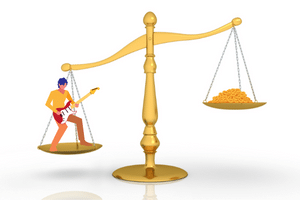
Blues is not just a genre; it’s an emotion. The ideal blues tone is warm, slightly gritty, and dripping with soul. It should resonate with the listener, making them feel every note’s depth.
Guitars Commonly Used In Blues
While guitars like the Stratocaster and Gibson Les Paul have been popular choices due to their sharp piercing leads and thick, creamy tones, respectively, the Telecaster has carved its niche.
The Tele’s versatility allows it to produce both the warmth of a hollow body and the sharpness of a solid body, making it a formidable choice for blues players.
Telecaster Vs. Stratocaster

Sound Differences: The Telecaster is renowned for its bright, twangy sound, often associated with country music but versatile enough for blues. Its single-coil pickups give it a sharp, clear tone.
The Stratocaster, on the other hand, while also equipped with single-coil pickups, offers a smoother, warmer sound, especially when using the neck pickup. The Strat’s contoured body design also allows for more tonal variations, especially with its three-pickup configuration.
Playability Comparison: Both guitars are known for their playability, but they have distinct differences. The Telecaster’s flat body and “C” to “D” shaped neck make it comfortable for many players, especially for rhythm playing.
The Stratocaster, with its contoured body and often slimmer neck profile, is favored by many lead guitarists for its ease of access to higher frets and overall ergonomic design.
Telecaster Vs. Les Paul
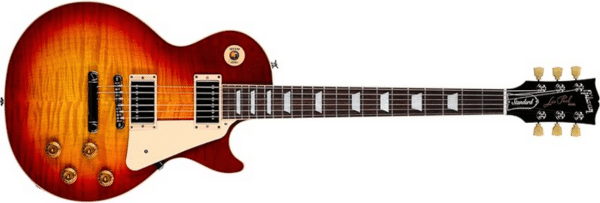
Tonality Contrast: The Telecaster, with its single-coil pickups, offers a brighter and more cutting tone. It’s known for its clarity and twang.
The Les Paul, equipped with humbucking pickups, provides a thicker, warmer, and more resonant sound. This makes the Les Paul especially favored for creamy, sustained lead tones and chunky rhythms.
Weight and Comfort: The Telecaster, generally made of ash or alder, is relatively lightweight, making it comfortable for extended playing sessions.
The Les Paul, typically made of mahogany with a maple top, is notably heavier. It’s single-cutaway design and set neck offer a different playing experience, with some players loving its heft and sustain, while others might find it a bit cumbersome during longer gigs.
My Take On Telecasters In Jazz
I like using Telecasters for aggressive, edgy-sounding blues playing that can “peel the paint off a wall!” For thick-sounding, slow blues with lots of sustained notes, there’s nothing like using a Les Paul. Strats are a great option for “all-around” blues, especially if you need a whammy bar.
If I had to choose just one guitar for blues, it would probably be the Strat, but that’s certainly not taking anything away from what a Tele can do!
Advantages Of Using A Telecaster For Blues
Versatility In Tone Shaping
The Telecaster’s dual pickups and tone controls allow players to shape their sound, from sharp lead tones to mellow rhythm sections, making it adaptable to various blues sub-genres.
Comfort And Playability
Although it has a non-contoured flat body design and a typically thicker neck profile, the Telecaster gives a comfortable and unique playing experience.
Durability And Reliability
Known for its rugged build, the Telecaster can withstand the rigors of touring and frequent gigs. Its simple design also means fewer components that could potentially fail, making it a reliable choice for professionals.
Potential Limitations And Considerations
Sound Limitations
While the Telecaster is versatile, some blues purists feel it lacks the warmth and fullness of guitars with humbucking pickups, especially when playing certain sub-genres.
Modifications And Upgrades
Many blues players modify their Telecasters to overcome some of its perceived limitations. Adding humbuckers, tweaking the electronics, or changing the bridge are common modifications to enhance its blues capabilities.
Aesthetic Considerations
The Telecaster’s design, while iconic, may not appeal to everyone. Those who want a more traditional blues look might lean toward other models, like a Gibson ES-335 or an Epiphone Casino.
Comparing Telecaster Models For Blues


| Telecaster Model | Pros | Cons |
|---|---|---|
| Standard Telecaster | Affordable, versatile | Might need upgrades for optimal blues tone |
| Telecaster Custom | Humbucker in the neck position, warmer tones | Pricier than the standard |
| American Professional Telecaster | High-quality pickups, improved sustain | Higher price point |
| Thinline Telecaster | Semi-hollow body offers richer, warmer tones | Less bite compared to solid body models |
Telecaster Pickups And Their Suitability For Blues

| Pickup Type | Tonal Characteristics | Suitability for Blues | Notes |
|---|---|---|---|
| Standard Single-Coil | Bright, sharp | Great for lead tones | Offers clarity and bite, perfect for cutting through a mix |
| Noiseless Pickups | Bright like single-coils, but without the hum | Versatile choice for various blues styles | Combines the clarity of single-coils with the advantage of noise reduction |
| Wide Range Humbucker | Warm, full | Perfect for rhythm and mellow leads | Reduces the Telecaster twang, providing a fuller blues sound |
Famous Blues Guitarists Who Use Telecasters
Over the years, several blues legends have chosen the Telecaster as their go-to instrument. Their unique playing styles and the Telecaster’s distinct tonal characteristics have combined to produce some of the most memorable blues sounds in history.
Let’s delve into a few of these iconic players!
Albert Collins
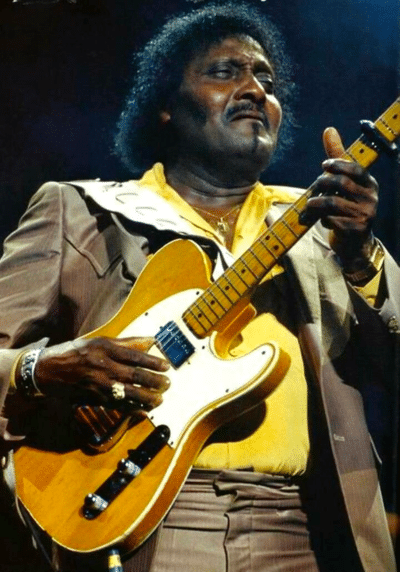
Description: Better known as “The Ice Man” and “The Master of the Telecaster,” Albert Collins had a unique sound characterized by his finger-picking technique and use of alternate tunings. His icy, piercing tone and innovative approach made him a standout figure in the blues world.
Playing Style: Collins often used a capo, which contributed to his distinctive sound. His sharp, stinging notes and powerful rhythmic drive showcased the Telecaster’s capabilities in the blues genre.
Roy Buchanan
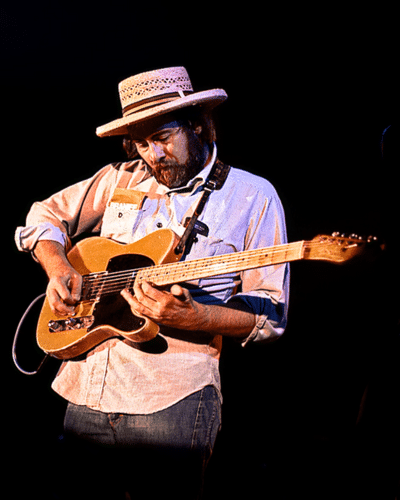
Description: Roy Buchanan, another Telecaster virtuoso, was known for his emotive playing and the ability to make his guitar “speak.” His use of pinch harmonics and volume swells added depth and dimension to his sound.
Playing Style: Buchanan’s technique involved a combination of fingerpicking and using the volume knob to create swells, giving the impression of a steel pedal guitar. His mastery of the Telecaster allowed him to produce sounds ranging from soulful cries to raw, gritty blues.
Tab Benoit
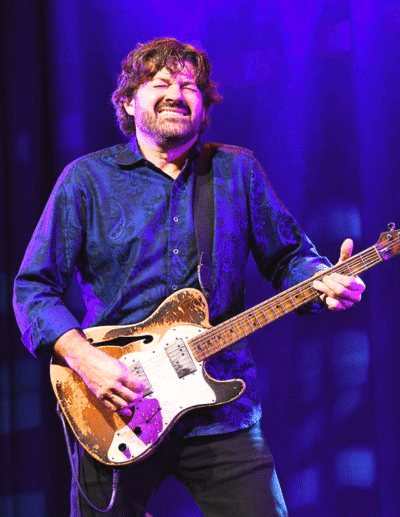
Description: Louisiana-born Tab Benoit is known for his Delta blues style and has been a prominent figure in the modern blues scene. His soulful vocals, combined with his Telecaster-driven sound, make for a compelling blues experience.
Playing Style: Benoit’s playing is deeply rooted in the Delta blues tradition. He often employs a clean, sharp Telecaster tone, using its natural twang to enhance his swampy, bayou-inspired sound.
Mike Bloomfield
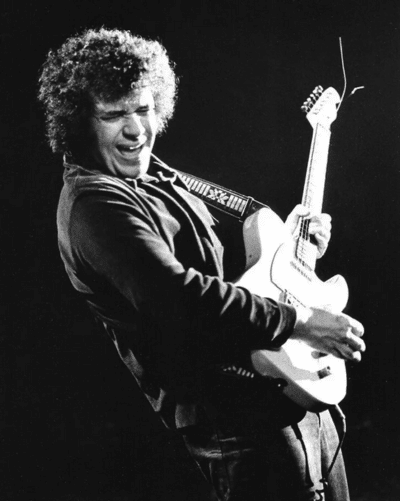
Description: As a key figure in the American blues revival of the 1960s, Mike Bloomfield was known for his fluid, rapid-fire playing. His work with the Paul Butterfield Blues Band and the Electric Flag showcased his prowess on the Telecaster.
Playing Style: Bloomfield’s style was a blend of traditional blues licks with a rock edge. His Telecaster provided the clarity and bite needed to cut through the mix, especially during his fiery solos.
Muddy Waters
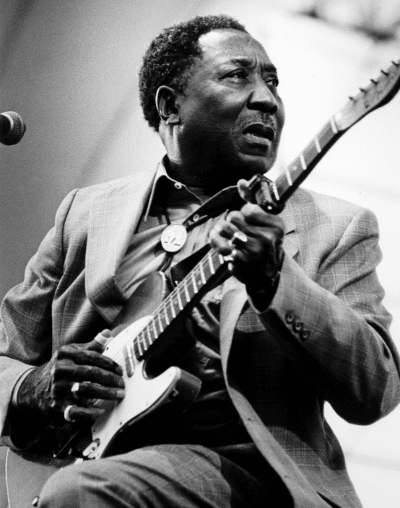
Description: While Muddy Waters (McKinley Morganfield) is often associated with other guitar models, he did use a Telecaster during various phases of his career. As a pioneer of Chicago blues, his influence on the genre is immeasurable.
Playing Style: Muddy’s approach to the Telecaster was all about raw power and emotion. He used its bright, cutting tone to deliver his signature slide licks and powerful riffs, laying the foundation for generations of blues guitarists to come.
Key Takeaways

Here are the key points of this article.
- Different Telecaster pickup types, from standard single-coils to wide-range humbuckers, offer varied tonal characteristics, allowing players to tailor their sound based on their blues preferences.
- Compared to other popular guitars like the Stratocaster and Les Paul, the Telecaster holds its own, offering unique sound differences and playability features that appeal to blues players.
- Iconic blues guitarists like Albert Collins, Roy Buchanan, and Tab Benoit have showcased the Telecaster’s capabilities in the blues setting, solidifying its place in blues history.
Are You Qualified To Make Guitar Adjustments Or Modifications?
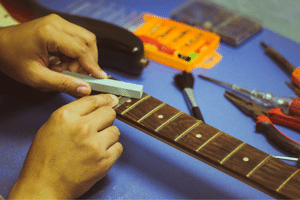
It’s great to work on your guitars, especially if you have a lot of them, but you should always be aware of your limitations.
Adjusting things like an electric guitar’s string height (action) or pickup height can be straightforward. Still, some adjustments require the proper training and experience, like adjusting a guitar’s truss rod.
When you doubt your ability to adjust, repair, or modify your guitar, it’s always best to bring it to a competent guitar technician or luthier (guitar designer & builder). You can permanently damage your guitar, and it might never play and sound right again!
Making modifications to your guitar can void its manufacturer’s warranty and cause permanent damage to the instrument. Certain modifications are irreversible, so you may be stuck with them, even if you desperately want to restore the guitar to its original condition!
I learned that the hard way over the years until I did a three-year apprenticeship in a guitar repair shop. Now I have my own home workshop with the proper training and equipment to safely maintain and repair all my instruments.
Remember: “When In Doubt, Send It Out!”
Frequently Asked Questions

Here are some of the questions I get asked about Telecasters and the Blues.
If your question does not appear here, please put it in the comments, and I will get right back to you with an answer.
Is A Tele Or Strat Better For Blues?
The Telecaster offers a bright, twangy sound and is known for its simplicity and durability. The Stratocaster provides a warmer, more versatile tone with its three pickups. Both guitars are iconic in Blues, and the choice between them often boils down to personal preference.
Which Pickup Is Better For Blues?
For Blues, both single-coil and humbucking pickups have their merits. The best pickup for Blues largely depends on the specific tonal qualities and style a player is aiming for.
What Strings Are Best For Blues Tone?
For blues tone, many players prefer medium to heavy gauge strings, such as .010-.052 or .011-.056, as they offer richer tone and better sustain. The string material, like pure nickel, can provide a warmer, vintage tone ideal for traditional blues.
Ultimately, the best strings depend on a player’s desired feel and tonal preference, with many blues guitarists experimenting to find their perfect set.
Are Telecasters Good For Small Hands?
Telecasters, with their “C” shaped neck profile, are generally comfortable for players with small hands due to their moderate neck width and depth. However, as with any guitar, individual comfort can vary, so it’s always best to try one in person to gauge its fit for one’s hand size.
Are There Specific Telecaster Models Designed For Blues?
While not exclusively for blues, models like the Telecaster Custom or Thinline can offer tonal qualities favored by blues players.
Is The Telecaster Suitable For Fingerstyle Blues?
Absolutely! The Telecaster’s clarity and definition make it a good choice for fingerstyle blues techniques.
How Does The Telecaster’s Bridge Impact Its Blues Sound?
The Telecaster’s bridge, especially the ashtray design, contributes to its bright and twangy character, enhancing its blues capabilities.
Can I Achieve A “Warm” Blues Tone On A Telecaster Without Modifications?
Yes, you can achieve a warmer blues tone by using the neck pickup and adjusting your guitar and amp tone settings.
Can I Use A Telecaster For Both Acoustic And Electric Blues Styles?
While primarily an electric guitar, the Telecaster can mimic acoustic qualities when played clean, making it versatile for both styles.
How Does The Telecaster’s Twang Influence Its Blues Sound?
The Telecaster’s characteristic “twang” is a bright and resonant sound, often associated with country music but also deeply impactful in the blues genre. In the context of blues, this twang can enhance the expressiveness of bends, slides, and other typical blues techniques. When played with overdrive or distortion, the Telecaster’s twang can transform into a gritty, raw tone, perfect for blues-rock styles.
Final Thoughts

The question, “Is A Telecaster Good For Blues?,” has been explored from various angles in this article. The Telecaster, with its iconic design and rich history, has proven time and again that it’s not just a country or rock guitar.
Its versatility, combined with its unique tonal characteristics, makes it a formidable instrument in the blues genre. From its sharp, biting tones to its ability to produce warm, mellow sounds, the Telecaster stands out as a reliable companion for blues enthusiasts.
However, like any instrument, the Telecaster isn’t without its limitations. Some purists might argue that it lacks the warmth of guitars with humbucking pickups or the resonance of semi-hollow bodies. Yet, many blues players have embraced these “limitations,” using them to carve out their unique sound and style. After all, blues is as much about individual expression as it is about tradition.
Whether you’re a seasoned pro or just starting your blues journey, the Telecaster offers a world of possibilities waiting to be explored!

Here’s an excellent video from “The Guitar Show,” which shows you all the different blues sounds you can get on a Black Guard, White Guard, and Thinline Tele!
If you’re not convinced about the ability of a Telecaster to give you a great blues sound after watching this video, then you’ll never be! ?
Check it out!
Related Article ➡ Is A Telecaster Good For Jazz? – Let’s Settle The Debate!
What To Read Next ➡ What Genre Is A Telecaster Good For? (It’s Not Just Country)
Tell Me What You Think
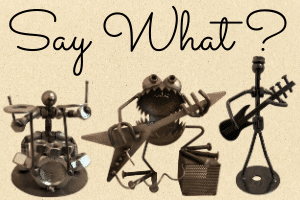
Please leave a comment below if you enjoyed this article, have any questions about Telecasters, or want to give your point of view. I will be happy to help you.
- What’s your favorite guitar for Blues? Why?
- Have you used a Telecaster to play Blues? Which One?
- After reading this article, are you thinking about getting a Tele?
- What else is on your mind?



Hi Frank
As a fellow blues enthusiast who has had the pleasure of playing the Telecaster, I can attest to its unmatched versatility and distinctive tonal qualities. It’s remarkable how this iconic guitar manages to deliver those sharp, biting tones and then transition seamlessly to those warm, mellow vibes that define the blues genre.
My own experience with the Telecaster in blues settings has been truly rewarding. Its ability to respond to different playing techniques and dynamic nuances makes it an ideal companion for expressing the emotions that define the blues. Have you found that the guitar’s tonal versatility allows you to explore various subgenres of blues with ease? Additionally, have you experimented with different pickups or settings to achieve the specific bluesy tones you’re after?
Your insights into how the Telecaster’s unique qualities contribute to its place in the blues world would be enlightening. After all, the intersection of instrument, technique, and genre is where the magic truly happens. Thanks for delving into the discussion about the Telecaster’s role in blues music – it’s a topic that resonates with many guitarists!
Sean
Hi, sean
Thank You for your comments!
Yes, the Telecaster is one of my go-to guitars for playing Blues! I particularly use it for blues that has a lot of attack, like the Albert Collins playing style. Several of my Teles have been modified with a variety of pickups and switching options.
Telecasters are a real workhorse of a guitar and so versatile!
Rock On! 🤘
Frank 🎸
What an insightful article! I’ve always been curious about the Telecaster’s versatility, and this piece really delved into its blues capabilities. I’m a fan of its twangy tones and how it can translate into those gritty blues-rock sounds. However, I’m left wondering about the impact of different types of amplifiers on the Telecaster’s blues performance. Has anyone experimented with various amps to bring out different shades of blues with this iconic guitar? Would love to hear more about that aspect!
Hi, Ashley
Thank You for your comments!
I plug my Telecaster into any amp you can imagine for great blues tones! I particularly like it through various Fenders, Marshalls, and Mesa Boogie amps. My particulate favorite for blues is probably my Mesa Boogie Blue Angel amp.
Keep On Rockin’! 🤘
Frank 🎸